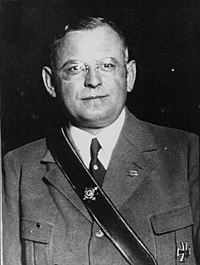Franz Seldte
| Franz Seldte | |
|---|---|

Reich Minister Seldte, 1933
|
|
|
Reich Minister for Labour Nazi Germany |
|
|
In office 30 January 1933 – 30 April 1945 |
|
| President |
Paul von Hindenburg (1933–1934) Adolf Hitler Führer (1934–1945) |
| Chancellor | Adolf Hitler |
| Preceded by | Friedrich Syrup |
|
In office 2 May – 23 May 1945 |
|
| President | Karl Dönitz |
| Chancellor | Lutz Graf Schwerin von Krosigk (Leading Minister) |
| Personal details | |
| Born |
29 June 1882 Magdeburg, German Empire |
| Died | 1 April 1947 (aged 64) Fürth, Allied-occupied Germany |
| Nationality | German |
| Political party |
DNVP (1918–1933) NSDAP (1933–1945) |
| Alma mater | Braunschweig University of Technology |
| Religion | Protestant |
Franz Seldte (29 June 1882 – 1 April 1947) was co-founder of the German Stahlhelm paramilitary organization, a Nazi politician, and Minister for Labour of the German Reich from 1933 to 1945.
Born in Magdeburg in the Prussian province of Saxony, Seldte was the son of an owner of a factory producing chemical products and soda water. He attended the Wilhelm-Raabe-Gymnasium in Magdeburg and, after an apprenticeship as a salesman, he studied chemistry at the universities of Braunschweig and Greifswald. In 1908 he took over the business of his early deceased father.
As an officer of the German Army he was wounded in World War I and lost his left arm. He then became a front reporter. Awarded with the Iron Cross 2nd and 1st class, he also was promoted to the rank of a Hauptmann (captain) in the 7th Reserve Division.
As a reaction to the German Revolution of 1918–1919, Seldte founded the Stahlhelm organization of World War I veterans on 25 December 1918, agitating against the Treaty of Versailles and German war reparations. According to Seldte, the organization was to use the spirit of the Frontsoldaten against the ‘swinish revolution’ taking place in Germany under the Weimar government. While he took charge of the Stahlhelm from 1923 onwards, he had to cope with the constant rivalry of his deputy leader, the militant Theodor Duesterberg.
...
Wikipedia
